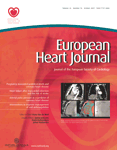-
PDF
- Split View
-
Views
-
Cite
Cite
Lars Olsson, Karl Swedberg, Six minute walk test, European Heart Journal, Volume 26, Issue 20, October 2005, Page 2209, https://doi.org/10.1093/eurheartj/ehi452
Close - Share Icon Share
Dr Refsgaard1 and Dr Hager have commented our article regarding ‘Six minute walk test’ (6MWT).2 We concluded that ‘6MWT’ is a simple and inexpensive test, which is not robust enough to evaluate treatment effects in clinical trials. However, it may have a role in clinical practice as a routine part of evaluation (as many patients avoid symptoms by reducing their activity). A recently published trial on 1077 elderly heart failure patients shows that change in symptoms corresponds with change in 6MWT walking distance.3 The corridor walk test is limited by some very practical consideration such as the length of a quiet corridor where the patient's performance will not be affected by the staff. We agree that encouragement should be administered, not only for improving patients performance on 6MWT, but also to comfort the patient who might find it awkward to walk in silence for 6 min. Standardization of encouragement may be of value. The value of repeated baseline walk tests is disputed. In the statement issued by the American Thoracic Society (ATS) regarding execution of the 6MWT change in walk length from first to second walk varied from 0 to 17% in a variety of diseases including chronic heart failure, and the authors concluded repeated baseline tests to be unneccessary in most settings.4 Indeed, 6MWT has proven to yield equally stable results regardless of repeated walk tests.3,5
Ultimately, the 6MWT can be of use in the clinical setting and in evaluating treatment in selected heart failure patients, but in order to ascertain comparable and reliable results there is a need for further standardization. We agree with Dr Hager that the statement issued by ATS can provide the framework for this.
Regarding peak oxygen uptake as the ‘golden standard’ of heart failure assessment we must respectfully disagree with the author. Peak oxygen uptake has in our opinion, with the exception of patients eligible for heart transplant, not outperformed 6MWT, neither as a prognostic indicator nor in the evaluation of treatment6 and is more expensive to use and more cumbersome for the patient.
Conflict of interest: none declared.
References
Refsgaard J. ‘This is a walking test, not a talking test’: the six minute walking test in congestive heart failure.
Olsson LG, Swedberg K, Clark AL, Witte KK, Cleland JG. Six minute corridor walk test as an outcome measure for the assessment of treatment in randomized, blinded intervention trials of chronic heart failure: a systematic review.
Ingle L, Shelton RJ, Rigby AS, Nabb S, Clark AL, Cleland JG. The reproducibility and sensitivity of the 6-min walk test in elderly patients with chronic heart failure.
ATS statement: guidelines for the six-minute walk test.
Demers C, McKelvie RS, Negassa A, Yusuf S. Reliability, validity, and responsiveness of the six-minute walk test in patients with heart failure.



